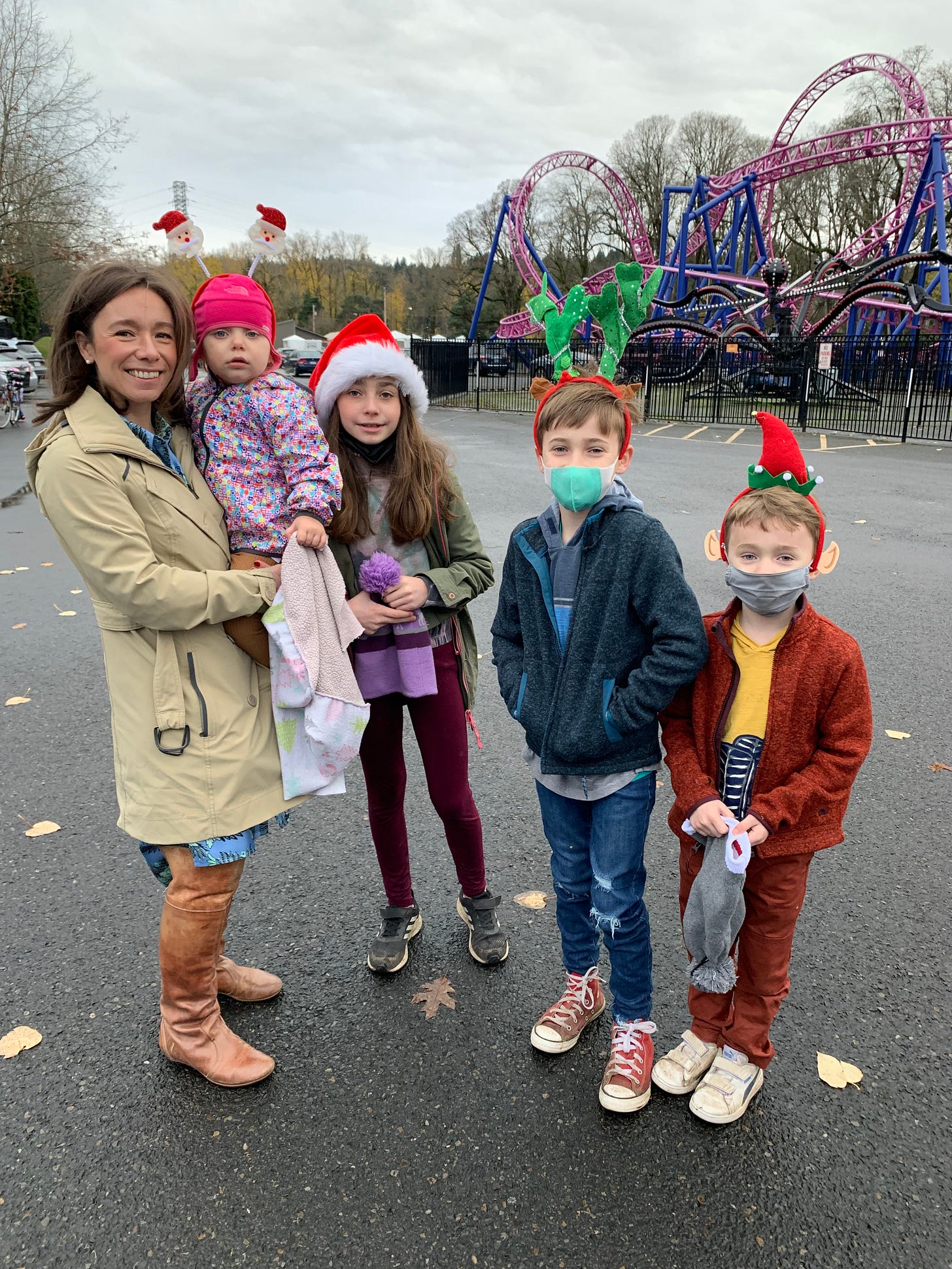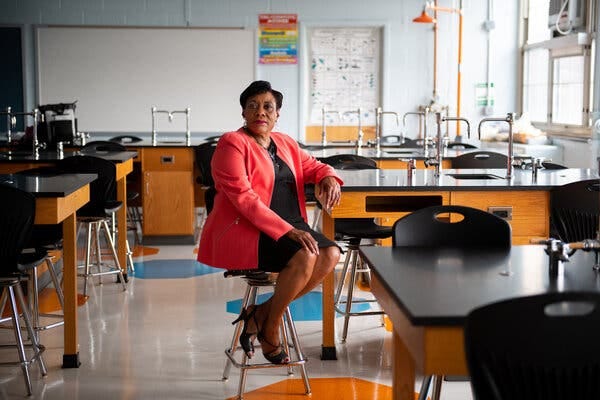In late summer, the Delta variant complicated school reopening in many unexpected ways. State and local leaders were challenged to make rapid decisions about virtual learning, masking, physical distancing, quarantine, and vaccination policies. Unfortunately, many states failed to provide timely guidance for school districts. So, instead of 50 states doing school 50 different ways, we had more than 13,000 school districts making hyper-localized decisions resulting in little accountability for equity or quality.
With the Omicron variant predicted to spike next month, we are at a similar crossroads, yet again. But, this time we are experiencing pandemic-fatigue. In addition, the disproportionate influence of the pandemic on under-resourced communities means that the K-shaped recovery will leave our most vulnerable less equipped to prevent Omicron’s negative influence on their lives.
This week, I planned to write a heartwarming holiday message in my prelude to the hotlist, but instead it feels more important for us all to anchor to a few key steps as we begin an uncertain 2022:
We need bold, transparent, and accountable state leadership, immediately.
In my role at CRPE, I tracked state policies emerging in response to the Delta variant throughout the summer and fall. The most notable takeaway was that state leaders (e.g., governors, legislators, state boards of education, and education commissioners) were much too slow to create responsive policies for the changing challenges in school buildings. As of October, the vast majority of states shared no guidance on taking attendance during quarantine or how to make school closure decisions during the 2021-22 school year. This lack of state-level governance over high-stakes decisions leaves school leaders on unstable footing as they attempt to restart schools in 2022.
We need schools to stay open, period.
It is dangerous to fall into the trap of thinking we can predict what’s coming next with COVID-19, however studies have documented over and over again that students who were in school buildings were far better off than those who were offered no form of in-person learning. Moreover, time consuming conversations about whether or not to close schools merely depletes local leaders of the critical resources and capacity they need to serve kids socially, emotionally, mentally, and academically. For example, days of labor partner negotiations or planning for remote learning options with no runway at all will only harm kids and families. Instead, we should all agree that there will be tradeoffs to adapt to the uncertain landscape of schooling during a pandemic, but nothing is worth giving up the time that our children can be in community with one another and their teachers.
We need to throw everything behind increasing vaccination rates and COVID-19 testing accessibility.
In a recent episode of the Daily, Carl Zimmer suggested that in the face of Omicron we must be on the side of humans and not COVID-19. This is a really important point; we are spending too much time fighting with one another instead of fighting the virus. Most importantly, government leaders are spending too much time putting out political fires surrounding straightforward actions that will combat the influence of COVID-19. Instead, we need functional intergovernmental strategies to increase vaccination rates and access to COVID-19 testing, immediately.
These three anchors can provide the US more certainty as Omicron peaks in the coming month and beyond. In the meantime, I hope the coming weeks are a respite for everyone; a time to rest, rejoice, and recharge for another uncertain New Year.
I literally blocked off time on my calendar this week to prep gingerbread houses, sugar cookies, and our new Christmas dinner tradition (one of my husband’s favorites) baked spaghetti!
For now, I am sending you all warm wishes for a very, merry holiday season!

PANDEMIC POLICY
Politico | A new state pandemic scorecard covers how states fared during the pandemic for health, economy, social well-being, and education.
“I got to the point where I was saying ‘Please, just wear the mask so you live long enough to vote against me,’” Minnesota Governor Tim Walz
NYT | The CDC announced that students who are unvaccinated and exposed to COVID-19 can stay under a new testing protocol.
NGA | A series of videos cover the most pressing education challenges for US governors, important topics during a year with so many governors office races.
Gadfly | A new podcast covers the details about how the child care subsidy and universal preschool programs must work in coordination with one another.
K12 Dive | Vaccination mandates are putting head start leaders in a really tough position to keep Head Start classrooms open.
The Hill | The Treasury Department and IRA made their final monthly child tax credit payment this month. The future of the payments awaits the future of the Build Back Better legislation.
The74 | There are many leadership changes across the US in the nation’s largest school districts, including a new Chancellor for NYC public schools and a move from Alberto Carvalho from Miami to Los Angeles.
Edunomics | A 30 minute webinar provides details about how states and feds are tracking pandemic relief spending plans.
TWO UNFINISHED LEARNING UPDATES
McKinsey & Company | Curriculum Associates data are used to illustrate the K-shaped recovery happening across the country.
“While some students are making up lost ground, others are stagnating. For example, students in majority-Black schools remain five months behind their historical levels in both mathematics and reading, while students in majority-White schools are now just two months behind their historical levels, widening pre-pandemic achievement gaps.”
NWEA | NWEA released updates to unfinished learning trajectories, which further illustrates how the pandemic disproportionately influenced student outcomes for under-resourced students.
“Achievement was lower for all student groups in fall 2021; however, historically marginalized students and students in high-poverty schools were disproportionately impacted, particularly in the elementary grades we studied.”
FEDERAL POLICY & THE US DEPARTMENT OF EDUCATION
Build Back Better | The Senate HELP Committee released updated language for the Build Back Better Act, working towards developing Senate negotiations.
Federal Reserve | The Federal Reserve will likely raise interest rates three times in 2022, citing that the economy no longer needs as much “policy support.”
Brookings | This piece unpacks the ways that equity is missing from the infrastructure package and how policymakers at all levels of government can ensure that equity shows up in plans and their implementation.
“Naming the people and places in need is a first step in stopping further harms and repairing past ones.”
USED | President Biden nominates LaWanda Toney for the role of assistant secretary for communications and outreach at USED.
Punchbowl News | I am obsessed with the new poll of congressional senior staffers called The Canvas. Take a look for the most recent top takeaways.
IES | American Rescue Plan funds at the federal level will help IES fund STEM innovations across the US.
USED | The US Department of Education announced $182 million in new grant awards to 30 school districts, higher education institutions, and non profits across the country. The Education Innovation and Research (EIR) awards for 2021 includes $73 million that will support students’ social and emotional learning.
NYT | Great piece on the role that NEA President, Becky Pringle, has played in repositioning teachers’ unions during the Biden administration. An interesting governance analysis might include a comparison of how local unions are experiencing this administration.
“I’ll never allow anyone to not see me again.” - Becky Pringle, NEA President
STATE AND LOCAL POLICY
Eduwonk | Andy writes about two really tense school topics, city roles In local political tension and parental responsibility for school shootings.
K12 DIVE | NH lawsuit may have significance in others states where teachers and families are trying to stop laws that ban discussing racism.
Chalkbeat | New York is looking to raise funding for schools for next years’ budget, including more money to staff the state education department itself.
TEACHING AND LEARNING
AEI | A new take on urban literacy policy in NYC. This is critical racial equity lever that all school districts should commit to taking on immediately.
EdSource | Play is important for all students. It helps with executive function and academic achievement.
Chalkbeat | Chicago executive, Pedro Martinez, will prioritize filling staffing shortages to ensure students with disabilities receive services this year.
NPR | This story covers the value that arts education playS in recovering from the pandemic and I cannot agree more. My early research focused on creativity and other non-academic skills that are key for lifelong success. More importantly, these programs should be integrated into the school day in as many ways as possible.
Ed Trust | Two new reports unveil the landscape of how students of color are disproportionately taught by novice educators and recommendations to remedy this critical systems failure (the report on the landscape for Latino students and the report on the landscape for Black students).
ASSESSMENT AND ACCOUNTABILITY
Chalkbeat | 37 Illinois legislators are calling on ISBE to pull back from assessment innovation choice in the near future, citing some interesting concerns, including expanding tests to younger grades.
The74 | Assessment and accountability experts are suggesting that states pause typically accountability indicators and opt for local, adaptable data instead.
“To start, states should quantify the magnitude of pandemic learning losses. They should suspend their old accountability measures and replace them with specific targets for each school and district to bring students back up to their pre-pandemic performance by spring 2024”
RACIAL EQUITY AND SOCIAL JUSTICE
WestEd | A webinar and panel on creating culturally affirming spaces in schools.
EdWeek | A video covering the reasons why the US teaching workforce is so white, including policies and bias.
REACH | A new study released from the REACH center elevates missing state guidance for centering equity in school choice, including sharing meaningful information, transportation, and enrollment processes.
Dr. Christine M. T. Pitts serves as Resident Policy Fellow at the Center on Reinventing Public Education. As an Oregonian, raised by a multicultural family of educators, she brings over a decade of strategic leadership experience advancing a transformative vision for US education systems and bringing analytic skill to evidence-based policy agendas. Prior to joining CRPE, Christine led research and evaluation for Portland Public Schools in Oregon and served as Policy Advisor at NWEA. Her academic research, focusing on accountability, governance, and social networks, can be found in Educational Researcher and Teachers College Record. Christine has served in schools across the country as a 3rd grade teacher, reading specialist, and school and district administrator. Christine earned her BS and MAEd at East Carolina University, as well as her PhD at the University of Oregon. Christine lives with her husband and four children in Portland, Oregon. Follow her on Twitter @cmtpitts.






